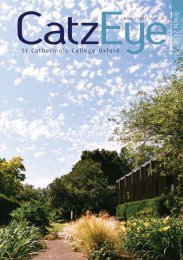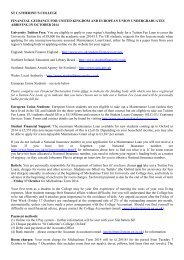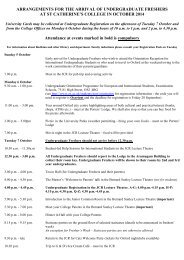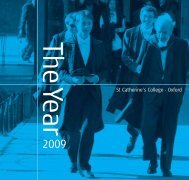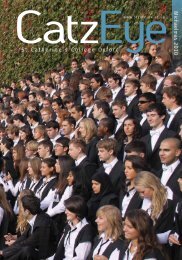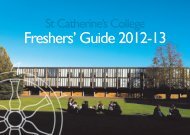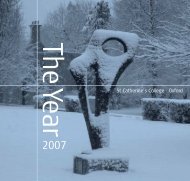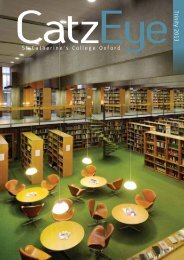Download PDF - St. Catherine's College
Download PDF - St. Catherine's College
Download PDF - St. Catherine's College
- No tags were found...
You also want an ePaper? Increase the reach of your titles
YUMPU automatically turns print PDFs into web optimized ePapers that Google loves.
CATZ FELLOWSpublished in the USA and Britain and in a Spanishtranslation in 2002. Rather to my surprise the Englishedition has recently gone into paperback. I would like tothink that film rights will follow shortly, so that I can fundthe extravagant lifestyle in retirement which I have nothitherto enjoyed. But I am not counting on it. <strong>St</strong> John andhis older contemporary <strong>St</strong> Teresa of Ávila are regarded asthe most important writers of the Western mysticaltradition. You may be surprised to learn that there is such athing, or be tempted to dismiss mysticism as some form ofhigher nonsense. But it is impossible to deny the intenselyrical beauty of <strong>St</strong> John’s poetry, the painful yet creativeanalysis of the self in his treatises, or the presence of hisvoice in many writers across boundaries of language andtime – T S Eliot and Seamus Heaney, to name just two.By the time I had finished the book my attention hadalready turned elsewhere, towards the artistic traditionsof Golden-Age Spain, in part out of a sense of frustrationthat I was not really understanding the paintings I feltduty-bound to admire. Research often starts like that.But there was also a more positive cause. I had beendeeply impressed by the Spanish still-life exhibition atthe National Gallery in 1995, and especially by theextraordinary paintings by the Carthusian Juan SánchezCotán, of cabbages, melons, gourds and other fruit andvegetables strung in a parabola against a dark background.The elevation of humble objects into these mysterious andwonderful things reminded me of passages in the worksof Luis de Góngora, perhaps the most difficult of allthe Golden-Age poets. I began to read, and, as always,what appeared at first to be a nicely defined topic openedso many doors that my initial plans proved hopelesslyunrealistic. That also happens with research. I did, however,put together a Master’s course on literature and painting inBut it isimpossibleto deny theintense lyricalbeauty of<strong>St</strong> John’spoetry ...the Golden Age, which has attracted a number of graduatestudents, one of whom has recently gained his doctorateand two more of whom are close to submission. I havefound this very rewarding. Two periods of sabbatical leavehave enabled me to do more sustained reading and tobegin writing. The book I am planning, significant parts ofwhich are already in draft, will cover a number of areas inwhich the interplay between the visual and the verbalenriches our understanding of the period: poems whichdescribe real or imagined works of art; paintings whichrequire knowledge of written sources to decode them;painters who wrote treatises on their art; paintings in whichbooks or manuscripts play a significant part; the sharedanalytical and critical language of literature and painting;attitudes to difference (by which I principally mean thereception of non-Spanish artists, notably Hieronymus Boschand El Greco). Do not ask me – yet – how it will all fittogether. The laborious process of writing the first draftsis the only way, in my experience, in which the broaderthemes and the overall focus can emerge from the detail.The demands of teaching, examining and administrationmean that research time gets severely squeezed, even inthe Long Vacation. So do not ask me, either, when I expectto finish. I firmly believe that a book is likely to be betterfor being cooked long and slow.When not engaged in teaching and research, Colincontinues to serve as a minister of the United ReformedChurch in what he describes as a ‘non-stipendiary andvery spare-time capacity’ in Wheatley, just outside Oxford.Having completed a four-year stint as Senior Tutor in 2007,he has since been elected by Congregation to serve on theUniversity’s Council for four years, with a clear commitmentto maintain and enhance the participatory democracy whichcharacterises Oxford’s governance.ST CATHERINE’S COLLEGE 2008/49



